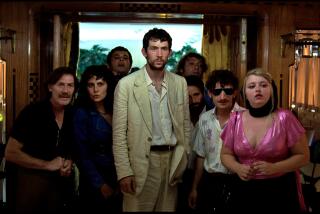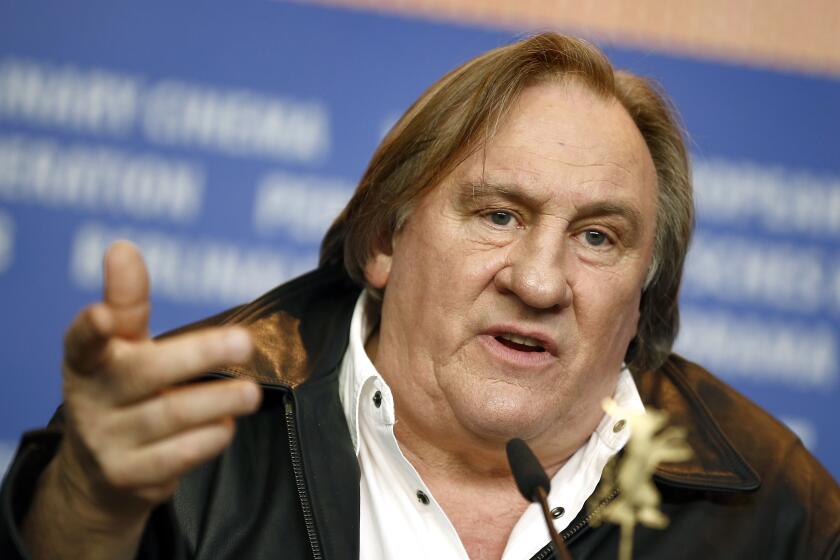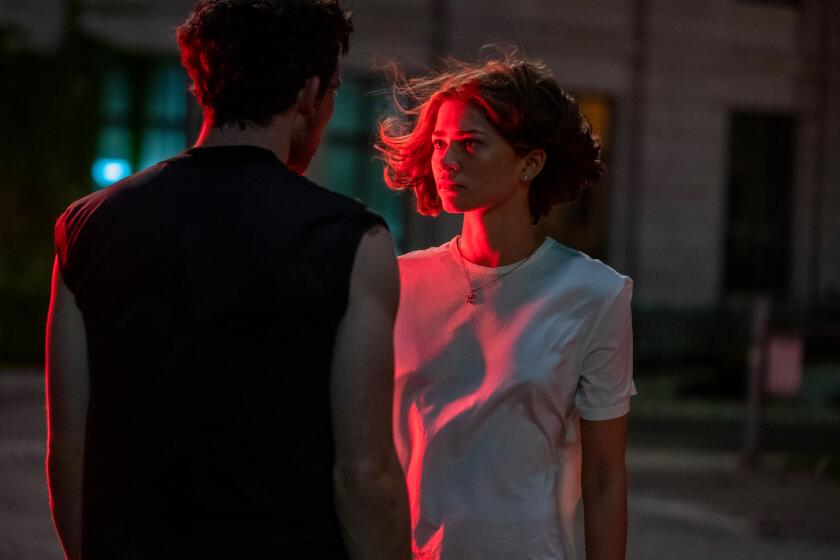Character Mortdecai has much in common with creator Kyril Bonfiglioli
The indelible Charlie Mortdecai, literary offspring of the English novelist Kyril Bonfiglioli, was featured in three marvelously funny novels before his creator died, of cirrhosis, at the age of 56.
This past weekend he made the voyage from page to screen in “Mortdecai,” which stars Johnny Depp in the title role.
The overlooked Bonfiglioli was a somewhat shady art dealer who came late to fiction. Born in 1928 to an Italian Slovenian father and English mother who, along with Bonfiglioli’s younger brother, was killed by a German bomb during the Blitz, Bon, as he was known, lived a life dominated by drink and chaos.
Bonfiglioli joined the English army and served in the Royal West African Frontier Force in Sierra Leone. He left the army and entered Balliol College, Oxford, and began to study English literature and dabble in rare paintings and antiquities.
He had already started a family. His first wife died and left him with two young children. He would go on to have other children, and more rocky relationships, all ending badly, as he shuffled from Oxford to Lancashire to the island of Jersey, and his fortunes waxed and waned.
Before he turned to fiction, he himself was the stuff of Oxford legend. He was said to have tricked a local gallery owner into accepting 40 pounds for a “fake” Tintoretto, which he then sold as a “lost” Tintoretto for 2 million pounds — and promptly bought two Rolls-Royce Silver Clouds.
He insisted his master creation, Mortedecai, was entirely fictional, stating in the foreword to the first novel, “Don’t Point That Thing at Me”: “This is not an autobiographical novel; it is about some other portly, dissolute, immoral and middle-aged art dealer.”
In “After You With the Pistol,” the second book, the author writes, “Any similarity to real people or corpses is both accidental and disgusting.”
But he and his hero shared many characteristics. Mortdecai said of himself, “I like art and money and dirty jokes and drink,” and described himself as “of barely average height, sadly over-age weight and possessed of the intriguing remains of rather flashy good looks.”
This was all true of Bonfiglioli, who described himself as “an accomplished fencer, a fair shot with most weapons” and “abstemious in all things except drink, food, tobacco and talking.” He wrote self-effacingly, but perhaps accurately, that he was “loved and admired by all who know me slightly.”
As Bonfiglioli’s second wife, Margaret, wrote, the character of Mortdecai was “drained of almost all the living author’s most endearing characteristics and given all his vices in exaggerated form.”
A man steeped in contradiction, Bonfiglioli was thoroughly disdainful of the typical English gentleman but desperate to be mistaken for one, and as crafty about making money as he was bereft of any talent for keeping it.
“He would have preferred to dress like an English country gentleman, or like his idea of an English country gentleman,” Margaret said in an interview. “In his imaginary life, he had only the best.”
In his fiction, he gave Mortdecai the best — vintage port, fine cars, haute cuisine and Savile Row’s finest raiments.
Writer and character, too, share immense education.
“He had a mind like a Georgian mansion,” his friend and colleague, the science fiction writer Brian Aldiss, said. “This is why I was so fond of him. He knew so much.”
An avid reader of the works of Evelyn Waugh and Ian Fleming, and according to Margaret a fan of the short stories of O. Henry and the crime novels of Ed McBain, Bonfiglioli was a master prose stylist whose books are more an exercise in creative language than in crafty plotting.
In tone, the novels are somewhere between P.G. Wodehouse and Raymond Chandler: Violent and nasty things happen, accompanied by wickedly funny repartee.
Mortdecai, in first-person narration, is arch and coy, sharing his observations with the reader in chatty asides. Advising against the practice of having sex in bed, he says:
“If you are too tired to have intercourse except in bed you are probably too tired anyway and should be husbanding your strength. Women are the great advocates of sex in bed because they have bad figures to hide (usually) and cold feet to warm (always). Boys are different, of course. But you probably knew that.”
Bonfiglioli published the first Mortdecai book in 1973, and followed it with “After You With the Pistol” and “Something Nasty in the Woodshed.” (He also wrote a comic historical novel, “All the Tea in China,” purportedly about Mortdecai’s seafaring ancestors. An unfinished fourth installment, “The Great Mortdecai Moustache Mystery,” was completed by the satirist Craig Brown after Bon’s death.)
In the densely complex trilogy, Mortdecai is assisted in his crooked endeavors by his manservant Jock, whom he introduces as “a sort of anti-Jeeves: silent, resourceful … but sort of drunk all the time, really, and fond of smashing people’s faces in.”
Between them, the two survive operatives from Scotland Yard, MI5 and the CIA, crooked art forgers and gallery owners, sinister nymphomaniacs and even the challenges of a road trip through the American West.
Now they have made the transition to cinema, a result of screenwriter Eric Aronson’s having picked up a copy of “Don’t Point That Thing at Me” in a London bookshop in 2003. He became smitten and spent the next decade trying to convince someone, anyone, to help him make it a movie.
The project was envisioned as a Sacha Baron Cohen vehicle, for a period, but languished until Depp took an interest.
The trip has altered the title character somewhat. Whereas Bonfiglioli’s hero is educated, urbane and more intelligent than any of his nemeses, the movie’s Mortdecai is a simpering twit.
If the Mortdecai of the books can be fairly described as halfway between James Bond and Bertie Wooster, the Mortdecai of the movie is more like the unfortunate love child of Austin Powers and Inspector Clouseau — benign but befuddled, and bullied, bested or brow-beaten by everyone around him.
The transmogrification is partly Depp’s doing.
“The moment Johnny takes on a character, it changes,” Aronson said last week. “He brought in more British eccentricity.”
Speaking in a peculiar accent of his own devising, and sporting a gap-toothed smile that is said by the filmmakers to be a homage to Terry-Thomas, Depp-as-Charlie mumbles, preens and prevaricates ineffectually, flummoxed at every turn by villains too clever or creative to outwit.
The other characters from the books make a more successful transition. The thick thug Jock, played brilliantly by Paul Bettany, has become an irresistible ladies’ man. The Scotland Yard detective Martland, described by Mortdecai as looking like “a portly elf hoping to be picked up by a leprechaun,” is now a suave, eloquent adversary, played by Ewan McGregor.
Johanna, introduced in the first book as the Viennese nymphomaniac wife of Mortdecai’s vulgar American client Krampf, is now Mortdecai’s wife — a genteel, upper-class Englishwoman, played effectively by Gwyneth Paltrow. (The nymphomaniac remains but is now Krampf’s daughter, in the part played by Olivia Munn.)
Will movie audiences be drawn to the underlying books? Tellingly, there appears to be no novelization of “Mortdecai,” the movie, in book form.
Aronson, who said he is eager to write a sequel, hopes people will see the movie and buy the novels. “Nothing would make me happier,” he said. “People should know this man and his work.”
Bonfiglioli died in 1985, alone, indigent and ignored. But in the years since, his work has been admired by readers as disparate as Hugh Laurie, Stephen Fry and Julian Barnes.
The Spectator called “Don’t Point That Thing at Me” a “comic masterpiece” and said it contained “some of the funniest writing since the war.” The London Independent said the books were “scabrous, witty and rude in the very best sense.”
Despite that, and an omnibus edition of the three original Mortdecai books published in America by Overlook Press, Bonfiglioli’s books are not read as widely as they should be.
The good news for the reader? The real Mortdecai is still there, waiting to be discovered.
More to Read
Only good movies
Get the Indie Focus newsletter, Mark Olsen's weekly guide to the world of cinema.
You may occasionally receive promotional content from the Los Angeles Times.







